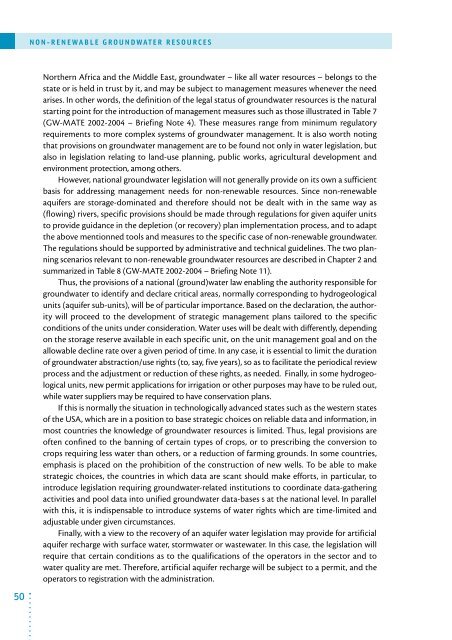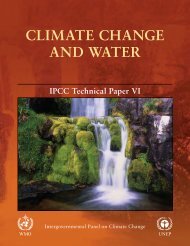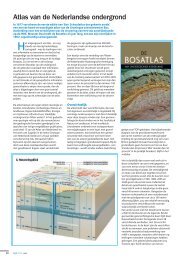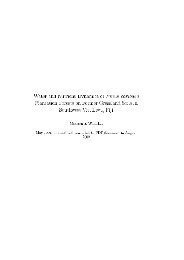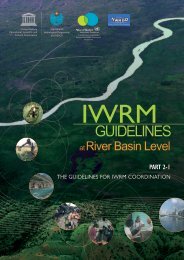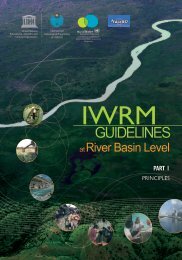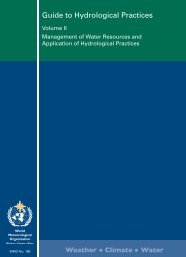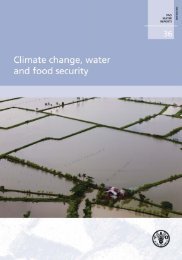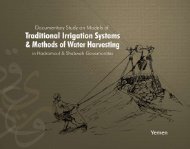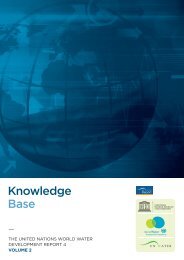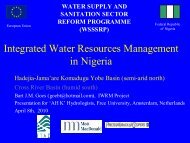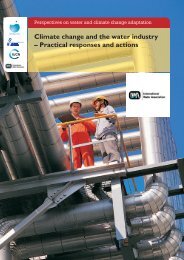Non-renewable groundwater resources: a ... - unesdoc - Unesco
Non-renewable groundwater resources: a ... - unesdoc - Unesco
Non-renewable groundwater resources: a ... - unesdoc - Unesco
- No tags were found...
You also want an ePaper? Increase the reach of your titles
YUMPU automatically turns print PDFs into web optimized ePapers that Google loves.
NON-RENEWABLE GROUNDWATER RESOURCES50Northern Africa and the Middle East, <strong>groundwater</strong> – like all water <strong>resources</strong> – belongs to thestate or is held in trust by it, and may be subject to management measures whenever the needarises. In other words, the definition of the legal status of <strong>groundwater</strong> <strong>resources</strong> is the naturalstarting point for the introduction of management measures such as those illustrated in Table 7(GW-MATE 2002-2004 – Briefing Note 4). These measures range from minimum regulatoryrequirements to more complex systems of <strong>groundwater</strong> management. It is also worth notingthat provisions on <strong>groundwater</strong> management are to be found not only in water legislation, butalso in legislation relating to land-use planning, public works, agricultural development andenvironment protection, among others.However, national <strong>groundwater</strong> legislation will not generally provide on its own a sufficientbasis for addressing management needs for non-<strong>renewable</strong> <strong>resources</strong>. Since non-<strong>renewable</strong>aquifers are storage-dominated and therefore should not be dealt with in the same way as(flowing) rivers, specific provisions should be made through regulations for given aquifer unitsto provide guidance in the depletion (or recovery) plan implementation process, and to adaptthe above mentionned tools and measures to the specific case of non-<strong>renewable</strong> <strong>groundwater</strong>.The regulations should be supported by administrative and technical guidelines. The two planningscenarios relevant to non-<strong>renewable</strong> <strong>groundwater</strong> <strong>resources</strong> are described in Chapter 2 andsummarized in Table 8 (GW-MATE 2002-2004 – Briefing Note 11).Thus, the provisions of a national (ground)water law enabling the authority responsible for<strong>groundwater</strong> to identify and declare critical areas, normally corresponding to hydrogeologicalunits (aquifer sub-units), will be of particular importance. Based on the declaration, the authoritywill proceed to the development of strategic management plans tailored to the specificconditions of the units under consideration. Water uses will be dealt with differently, dependingon the storage reserve available in each specific unit, on the unit management goal and on theallowable decline rate over a given period of time. In any case, it is essential to limit the durationof <strong>groundwater</strong> abstraction/use rights (to, say, five years), so as to facilitate the periodical reviewprocess and the adjustment or reduction of these rights, as needed. Finally, in some hydrogeologicalunits, new permit applications for irrigation or other purposes may have to be ruled out,while water suppliers may be required to have conservation plans.If this is normally the situation in technologically advanced states such as the western statesof the USA, which are in a position to base strategic choices on reliable data and information, inmost countries the knowledge of <strong>groundwater</strong> <strong>resources</strong> is limited. Thus, legal provisions areoften confined to the banning of certain types of crops, or to prescribing the conversion tocrops requiring less water than others, or a reduction of farming grounds. In some countries,emphasis is placed on the prohibition of the construction of new wells. To be able to makestrategic choices, the countries in which data are scant should make efforts, in particular, tointroduce legislation requiring <strong>groundwater</strong>-related institutions to coordinate data-gatheringactivities and pool data into unified <strong>groundwater</strong> data-bases s at the national level. In parallelwith this, it is indispensable to introduce systems of water rights which are time-limited andadjustable under given circumstances.Finally, with a view to the recovery of an aquifer water legislation may provide for artificialaquifer recharge with surface water, stormwater or wastewater. In this case, the legislation willrequire that certain conditions as to the qualifications of the operators in the sector and towater quality are met. Therefore, artificial aquifer recharge will be subject to a permit, and theoperators to registration with the administration.


